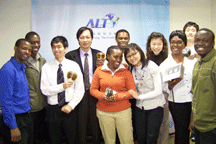
TAIPEI, Taiwan: – A local lighting company has recruited the assistance of 10 university students here as it tries to expand into the global market.
So far, the students have been able to secure visits to the company later this month by the president of Gambia and the Swaziland ambassador to Taiwan, James Liang, Chief Executive Officer of Aeon Lighting Technology Inc (ALT), told I Witness-News.
ALT, manufactureres of Light-emitting Dioxide (LED) bulbs, has organized a two-month internship programme for students of Ming Chuan University International College.
Students gain practical knowledge and complete their university-required internship while the company benefits from their talents and knowledge about potential markets in their respective countries.
“They are pure minded and we can get a lot of creative ideas from them. … They are helping us to expand the business worldwide,” Liang said.
The company had planned to reward an outstanding student with US$500 when the internship ends on May 23. However, ALT was so impressed with the students’ performance that that reward would be given to two or three students, Laing said.
Liang said the company, which has a staff of 23, was trying to create employment opportunities for the students when they graduate.
The students come from Malawi, Burkina Faso, Gambia, Swaziland, Korea, Indonesia and the United States.
They major in electrical engineering, applied computing and international business.
The internship is being conducted under the rubric “Save our Earth” and is in keeping with ALT’s “efforts to promote LED technology products, with a view to contribute to environmental protection efforts”.
American student Allen Huong said that his colleagues wanted to set up a recycling programme for LED.
He said that in most developing countries bulbs are disposed of in landfill and this could harm the environment when mercury leaks into the soil and waterways.
In addition to containing no mercury, an LED bulb uses 10 percent of the energy of an incandescent bulb and 50 percent of a florescent bulb.
Liang however noted that LEDs are significantly more expensive and the products on the market are mostly for street lighting and commercial lighting. Currently, an LED bulb for domestic cost US$70 to US$80 and Liang said that his company was working hard to make LED products more affordable.
And, notwithstanding the large capital investments, Chitsanzo W. Kazembe of Malawi thought that his country would welcome a change to LED lighting, a view shared by fellow Malawian Charles Chalimba and Cheryllia Limasari of Indonesia.

Patience Cole of Gambia said that her country can be a launch pad for ALT products in Africa while Mariama K. Sanneh said that LED lighting was a way for the country to reduce its electricity cost.
Swaziland national Luke Fakudze said while he had never heard of LED lighting before the internship, he would readily recommend it to his government. He said that LED lamps last up to five years, consume less energy and are environmentally friendly.
Nonhlanhla Shongwe, also of Swaziland, said that with the global economic crisis, LED bulbs would be beneficial to her country, which imports some of its electricity from South Africa.
Ted Lee of South Korea helped ALT to develop a marketing plan. He said his government had implemented a “Green New Deal” programme which strongly recommended that citizens changes to energy efficient bulbs.
Zongo P. Eliezer of Burkina Faso told I Witness-News that while all countries are concerned about their energy bills, many companies don’t look at Africa as a market for energy efficient products.
He said that people on the continent are increasing interested in solar energy and LED product that uses solar energy will penetrate the African market.
Liang said that while combining LED and solar technology was a possibility, ALT was focused on reducing the cost of its LED products before considering a product for solar energy.
He further said that both LED and solar cells were new technology and combining two new technology might stagnant their development.
Los Angeles will this summer begin switching its incandescent street lighting to LED as it tries to reduce pollution and be more energy-efficient. The city will begin the replacement process this July, and it will continue over a five-year period.





